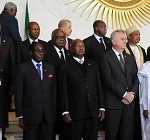Vice President Hamid Ansari was in Ethiopia on May 25 to represent India at the 50-year celebrations of the creation of the Organisation of African Unity (OAU). The OAU was set up to protect the sovereignty and the territorial integrity of African states in the post-colonial era. It is the precursor to the 54-member African Union (AU), which was established in 2001.
Leaders of African countries gathered at the iconic AU headquarters in Addis Ababa to discuss various issues. These included the role of the emerging economies of Africa, conflict situations, exploring alternative source of funding for the AU, the need for a military African Standby Force, reforms in the United Nation Security Council, and the relevance of the International Criminal Court (ICC) to Africa.
At this summit, the AU vowed to safeguard the interests of Africa in the on-going negotiations on reforms in the United Nations Security Council (UNSC). The AU is demanding two permanent seats with full veto powers to represent the continent.
With India also pursuing permanent membership of the UNSC, it can leverage its growing trade relationship with the AU for support at the UNSC. Over the last two decades, the emerging economies of Africa have developed important bilateral partnerships India and with other emerging economic powers, especially Brazil and China.
India’s trade exchanges with Africa are expected to touch $90-$100 billion by 2015, with the balance of trade in favour of Africa. New Delhi is also shifting its investments in procuring energy away from the increasingly unstable West Asia and into Africa. At 17%, Africa is currently the second biggest source of crude oil imports for India. [1]
Indian companies are increasingly active in such oil-rich regions as Cote d’Ivoire, Libya, Egypt, Angola and Gabon. Indian private companies and public sector units already have oil investments in Mozambique and investments in the gas sector in Kenya and Tanzania.
India is involved in building critical rail and road infrastructure in Ethiopia, Djibouti and Uganda. And Africa is becoming a key destination for Indian investments in the software, telecom, and financial sectors. China and India are partnering with Malaysia in a joint venture in the Greater Nile Oil Project of Sudan. [2]
Besides trade, India also provides development assistance to Africa, largely on an equal partnership basis. This is distinct from the assistance given by the OECD/ Development Assistance Countries or the Chinese model, which attaches investments to loans. Just last year, India consolidated its efforts to set up the Development Partnership Agreement (DPA), its own international aid agency. The new agency, under the Ministry of External Affairs, will focus an initial corpus of $15 billion to streamline projects in more than 60 countries around the world. At the AU summit, the participants agreed to explore new funding alternatives and move away from the dependence on donor partners. This too can signal a greater role for India in Africa.
India, Brazil, and South Africa have established the IBSA forum, which links democratic development initiatives in Africa, Latin America and South Asia. It works on a model of democratic development as opposed to the authoritarian capitalism brought by Russia and China in the stronger BRICS forum.
In 2013, to further consolidate its relationship with Africa, Brazilian President Dilma Rousseff announced the cancellation of a $900 million debt of 12 African countries. Of the other prominent players in Africa, Brazil has the highest number of engagements after India and China. Africa’s trade with Brazil touched $27.6 billion in 2012, especially in agricultural products. [3]
China’s multilateral exchanges with Africa are, of course, growing rapidly. In fact, the AU headquarters in Addis Ababa was built by the Chinese at a cost of $200 million – and was then made a gift to Africa from China. This is in addition to China’s serious courting of Africa through diplomacy and development to secure its energy needs. Chinese companies and banks are associated with the construction of over 100 hydro-electric dams and various road projects in Africa. Various other initiatives in the China-Africa corridor include a $20 billion aid package announced during the tri-annual Forum on China-Africa cooperation in 2012, for developing infrastructure, agriculture, manufacturing, and small and medium-sized enterprises. As part of the ‘Africa Talent Programme’, China is investing in the training of 30,000 personnel in various sectors and has promised to offer 18,000 government scholarships by 2015. [4, 5]
Africa is endowed with resources which are crucial to fuel the economic powerhouses of India, Brazil and China. The AU is now in a position to leverage these assets to scale up trade and bilateral exchanges.
Anirudh Menon is Researcher, Africa Studies Program, Gateway House.
This essay was exclusively written for Gateway House: Indian Council on Global Relations. You can read more exclusive content here.
For interview requests with the author, or for permission to republish, please contact outreach@gatewayhouse.in.
©Copyright 2013 Gateway House: Indian Council on Global Relations. All rights reserved. Any unauthorized copying or reproduction is strictly prohibited.
References:
1. US Energy Information Administration; Country overview; Retrieved from http://www.eia.gov/countries/cab.cfm?fips=IN
2. US Energy Information Administration; Country overview; Retrieved from http://www.eia.gov/countries/cab.cfm?fips=SU
3. ‘Brazil in Africa: Just Another BRICS Country Seeking Resources?’. November 2012. Retrieved from http://www.chathamhouse.org/sites/default/files/public/Research/Africa/1112bp_brazilafrica.p
4. ‘Big is beautiful: Megadams, African water security, and China’s role in the new global political economy’. University of Oxford. Retrieved from http://oucan.politics.ox.ac.uk/index.php/blog/14059-big-is-beautiful-megadams-african-water-security-and-chinas-role-in-the-new-global-political-economy
5. ‘President Hu proposes new measures to boost China-Africa ties’. July 2012. Retrieved from http://english.gov.cn/2012-07/19/content_2187416.htm


